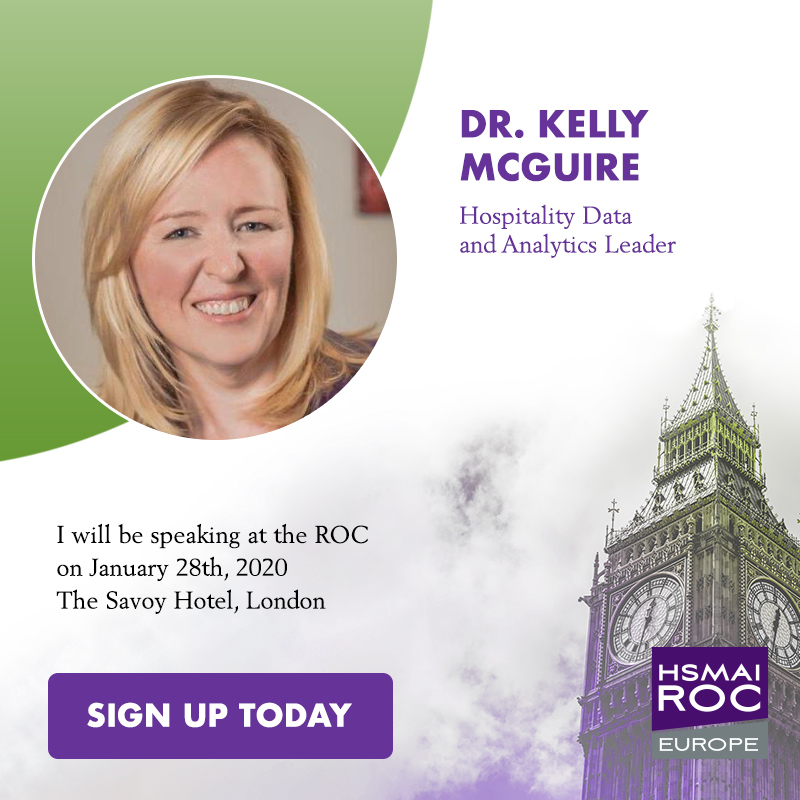By Dr. Kelly McGuire, PhD, Principal, McRevenue

I’ve been obsessively listening to Lady Gaga since I had the privilege of catching her pop and jazz shows in Las Vegas. I’m particularly obsessed with her song “The Edge of Glory”. It’s always been an inspirational song for me. I suggest that revenue management also take this as their anthem. Because, we are on the Edge of Glory. The industry is hanging by a moment with us… What concerns me is: What’s on the non-Glory side of the Edge? I’m pretty sure it’s mediocrity. And we are dangerously close to sliding into it. And at the bottom of the slope? Obsolescence…
Revenue management stands at a precipice (again). After 10ish years of growth and (relative, for some of us) prosperity, things might not be as easy or profitable moving forward. As much as revenue management changed how the industry thinks about hotel room pricing, lately we are tending towards complacency. We won battles a few years ago. We are near enough to the table to feel good. We still have our jobs (most of us). It’s easy to make money when times are good. Revenue management should also shine when times are not as great. Unfortunately, we are just not ready.
Why would I say that? I’ve spent some time recently speaking with industry leaders from inside and outside revenue management. Most of them are getting the feeling these days that revenue management isn’t quite living up to its potential or promise. There was a lot of momentum five or ten years ago, as we pulled out of the Great Recession, but that momentum has slowed or stalled in many cases. As Aymeric Erulin put it in his recent article, “Revenue Management: Have you been doing it wrong?”, instead of pushing for revenue optimization, revenue management tends to fall back on the same “pre-made sentences such as: ‘decreasing the price brings volume’ and ‘the performance achieved last year is the reference’”. Meanwhile, we talk a big game about industry innovations like total hotel revenue management or integrated marketing and revenue management. The innovations that never quite arrive. If pushed, maybe rising distribution costs get blamed. And we’re not doing much about that either.
Now all the talk is about how AI and machine learning are the future of hospitality. Let’s point out that most of “all the talk” is the technology vendors and third-party communities (trying to sell you something). This is the same community that brought us OTAs, benchmarking, social, eCommerce, attribution modeling and everything else we couldn’t build a strategy around fast enough to take and keep control over. I’m not saying they aren’t great partners, or that they haven’t made a huge difference in industry. They are and they have. I’m saying that the core strategy should be driven by the hotels, not their partners. The partners would probably agree with me. Technology should support and extend existing hotel strategy, yet we tend to wait around for a vendor to tell us what’s next and then build around whatever the vendor offers. We need to stop just waiting for the next big thing to happen to us, or we will risk being replaced by the very algorithms that are supposed to “save” us.
Steven Dow and I hosted the Great Debate: (Hu)Man versus Machine at the HSMAI EU ROC conference in Amsterdam two years ago, and Calvin Anderson and I repeated the event at the HSMAI Americas ROC in Houston. It was clear already at that time that AI and ML has huge potential. But it also takes great data, extensive computing power, and a lot of iterations to execute. Not to mention a deep bench of data science expertise, which most hospitality companies don’t have, and probably shouldn’t invest in. We’ve had that discussion. It’s not enough to continue to debate whether “machines” will take over in revenue management. “Take over” to me is a strong phrase. AI and ML should only support a fraction of the job of the revenue manager. If revenue management keeps acting as tactically as we are today, leadership will begin to wonder why they still need people. Remember, as a revenue leader you are not responsible for building the algorithms. You are in charge of the strategy, and how the algorithms will support it.
Here’s why I’m concerned. Revenue management has not yet successfully separated the job of the revenue manager from the job of the revenue management system. We all know that automation should free up the revenue manager to focus on strategy, but we have not proven that because revenue managers don’t always act like that. Our myopic focus on day to day pricing, overriding rates, creating excel files and allowing GMs, Asset Managers and Owners bully us on tactical pricing strategies has kept us in jobs (crappy ones), but kept us from being strategic partners. It’s also kept us from executing on initiative like total hotel revenue management, or better integration with sales and marketing.
Unfortunately for the people in this equation, the marketing messaging around machine learning reinforces the promise that the machine can price faster and better. It’s true. In fact, the machine always could even before computing power enabled the use of more complicated (and potentially unnecessary) AI and ML algorithms.
Of course, we need to understand what’s coming – and fully embrace the potential of machine learning in revenue management. But we need to do that in the context of our strategy and our business opportunities. With impending downturn, global political uncertainty and trade wars looming, there is a lot for revenue management to do. The machine learning silver bullet (whatever that is), is not “just around the corner” waiting to save the day. It will never be as easy as that. We can’t wait around assuming it will come to us eventually. It’s time to take control. It’s time to up our game and it’s time to be the strategic partners industry expects us to be.
Here’s what you need to do:
- Elevate: Try to get yourself and your team out of the weeds for at least a couple of hours a week. Maybe set up meetings with counterparts to talk market strategy (not promotions schedules or past performance). As you prepare for revenue strategy meetings, include a strategic component, and try to anticipate (and minimize) the discussions that will encourage the GM or asset manager to pull you into the weeds.
- Stay Educated: Attend conferences, host book clubs and point of view discussions, read articles – try to find as much industry generated content that you can about issues that will impact your job, like AI/ML, economic conditions, pricing techniques, technology development and leadership skills. This way you can figure out how innovations fit into your strategy.
- Focus on soft skills: Make sure you and your team are taking time to develop leadership skills, telling a story with data, communicating with influence and collaborating with other departments. This is how you become a strategic partner.
- Plan: As you are elevating, don’t forget to plan for the future. Not just forecasts or budgets, but team development, strategies and technology. Even if you don’t have the budget or the internal capability, it can’t hurt from time to time to make a wish list, or just brainstorm. Good ideas may come from this, and you’ll also be prepared when the opportunity arises.
- Keep lines of communication open: Develop close relationships with your counterparts in marketing, sales, distribution and operations. Plan regular knowledge sharing sessions about upcoming initiatives or even day in the life discussions. You’ll probably be surprised how many people make incorrect assumptions about opportunities, incentives and constraints in their counterparts’ organizations
Revenue management needs to stop the myopic and singular focus on day to day pricing and start thinking bigger and more strategically! This is the only way to ensure your organization can survive and thrive in what’s coming next. And it’s definitely the only way to make sure revenue management continues to have a seat at the table!

I’ll be in London for HSMAI EU’s ROC event in January, where I will be speaking about new pricing techniques for hospitality, some of which leverage AI&ML, but all of which will require careful planning and strategic alignment to execute properly. Join me and HSMAI EU to sharpen your skills and your strategy!

